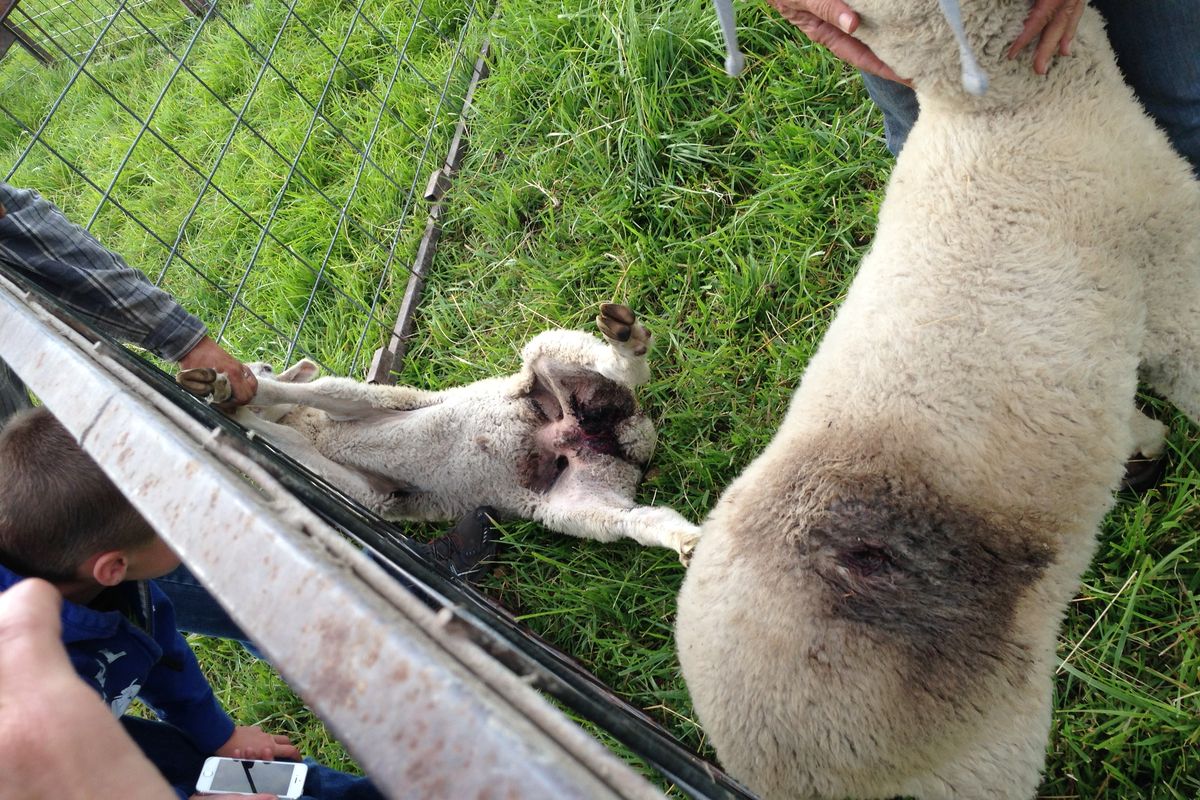Sheep removed from area of Stevens County wolf attacks after alpha female killed

UPDATED with this link to a subsequent blog post about using the term "alpha" female.
ENDANGERED SPECIES -- Washington wildlife officials confirmed today that the alpha female of a sheep-attacking wolf pack was killed by a helicopter shooter last month.
A Stevens County rancher has moved his sheep away from the site where a pack of six-12 wolves killed at least 24 of the animals since mid-August, the Washington Department of Fish and Wildlife has confirmed in a just-posted release.
The move comes after one of the wolves -- the Huckleberry Pack's alpha female -- was killed on Aug. 23 by a helicopter shooter. Wildlife officials had tried to target younger wolves to avoid interrupting the pack's social structure. However, the breeding female was small, only 66 pounds, and not easy to distinguish.
Kristin Mansfield, Washington's state veterinarian, just completed a necropsy today confirming the wolf killed to help stave off the attacks, was a 3 year-old breeding female.
Working through Labor Day weekend, rancher Dave Dashiell rounded up his flock of 1,800 sheep and herded them to temporary holding pens five miles away, and has begun trucking them to their winter pasture in the Columbia Basin.
WDFW field staff and 14 volunteers helped to round up the sheep and move them off the grazing land he leases from a private company about 50 miles northwest of Spokane.
- Stevens County Cattlemen's Association and Dashiell issued statements over the weekend complaining about being forced off private land for the sake of wolves.
Nate Pamplin, director of the agency's wildlife program, said the rancher’s decision to move his sheep earlier than usual will prevent further losses to his flock, but the department is cautioning other ranchers in the area to be vigilant as members of the Huckleberry pack move about their range.
“The threat to one rancher’s flock has passed, but there are other ranchers and other livestock in that area,” Pamplin said. “We need to make sure that the owners of those livestock operations – large and small – are aware of the pack’s presence and are taking necessary precautions.”
Pamplin said WDFW field staff will continue to monitor the movement of the Huckleberry pack and will contact other ranchers in the area to discuss appropriate protective measures, such as maintaining a human presence around their stock, using guard dogs, and removing animal carcasses whenever feasible.
On Aug. 22, at the height of the attacks on Dashiell’s sheep, WDFW authorized the removal of up to four members of the Huckleberry wolf pack, one of 13 documented packs in the state.
One female wolf was killed the next day by an aerial marksman from federal Wildlife Services contracted by the department.
In a necropsy completed today, the department’s wildlife veterinarian confirmed the wolf was the pack’s breeding female.
While other lethal measures were authorized, no other wolves have been removed.
Pamplin called the killing of the pack's breeding female an "unfortunate development, and one we hoped to avoid."
"We provided direction for individuals involved in aerial removals or trapping/euthanasia to try to remove smaller bodied animals. The wolf removed was likely three years old, in fair condition, but only weighed 66 pounds, and its status could not have been discerned from the air. We anticipate concerns about pack integrity; and while we don’t know what will happen in this specific case, we do know that other pack members can step into that role when an alpha is displaced.
The collared male in the Huckleberry Pack, believed to be the alpha male, has not been in the vicinity of the sheep flock since approximately Aug. 27, Pamplin said, noting that "the aerial operation may have assisted in keeping some distance from the sheep."
“Lethal measures continue to be an option if the pack attacks other livestock, but we will consider that option only after reasonable preventive efforts have been made,” Pamplin said.
He said WDFW has been contacted by many citizens, both opposing and supporting the department’s use of lethal measures to protect the rancher’s sheep.
Not getting what they wanted from the WDFW, environmental groups petitioned Gov. Jay Inslee to put limits on the agency's lethal wolf control options.
“Wolf management generates strong feelings on all sides,” Pamplin said. “We respect those feelings and will continue to do our utmost to ensure the recovery of wolves in Washington while working with ranchers to avoid and minimize conflicts with these animals.”
